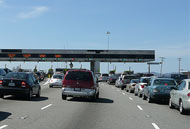9/18/2008
Delaware Toll Roads to Seize CarsPolice in Delaware have authority to seize any automobile registered to an owner accused of not paying tolls.

Delaware officials announced Monday that a new punishment will be imposed on motorists accused of not paying tolls. A state law approved in July empowers police with on-the-spot authority to seize vehicles belonging to anyone whose name appears in a computer database list of toll cheats. This means that, rather than go through the hassle and expense of proving this crime in a court of law before a neutral judge or jury, officers now enjoy the full power of imposing sentence on the roadside.
"Make no mistake, we will be out there and, when necessary, we will impound vehicles," Delaware State Police spokesman Jeff Whitmarsh said in a statement. "The intent of the law is clear and we will enforce it accordingly. Once a vehicle is impounded, notification may be given to other toll facilities along I-95 to be cross-checked for possible excessive toll violations in other jurisdictions."
The state will keep an impounded vehicle until the owner either pays the tolls, fines, impound and towing charges or proves his own innocence before a civil hearing officer. Such hearings are conducted under a reduced standard of legal proof favoring the state interest. Because no court oversight is required for the seizures, local police will be able to use electronic scanning systems known as Bootfinder or Plate Hunter to round up vehicles for seizure without the driver's knowledge.
The law specifies initially that cars may only be taken if the alleged total of unpaid tolls and penalty fees exceeds $1000, but Delaware has a history of boosting penalties for this infraction. In March 2007, the state began charging drivers accused of toll evasion with felony theft.
The fully automated systems that toll roads use to accuse motorists of cheating are far from perfect. In Texas, 50,000 motorists were overbilled by a system described by officials as having "zero defects." Virginia falsely accused 8000 drivers of cheating the state out of $105,000 in revenue last year. According to the accuracy rate determined in an audit of Harris County Toll Road Authority records, 67,000 motorists are falsely accused each year of skipping out on area tolls.
The fines and fees imposed on drivers who have faulty transponders can also be significant. An Illinois woman who did not notice that her credit card had expired was hit with $4620 in fines. A Florida judge was so outraged at the Florida Turnpike Authority's treatment of a volunteer firefighter falsely accused of toll cheating that he issued an injunction prohibiting "cheating" fines from being levied against drivers with valid toll accounts (read decision).
Article Excerpt:Delaware Code
CHAPTER 400, FORMERLY SENATE BILL NO. 291
AN ACT TO AMEND TITLE 21 OF THE DELAWARE CODE RELATING TO CIVIL ENFORCEMENT OF OUTSTANDING TOLL VIOLATIONS.
BE IT ENACTED BY THE GENERAL ASSEMBLY OF THE STATE OF DELAWARE :
Section 1. Amend Section 4129, Chapter 41, Title 21 of the Delaware Code by adding a new subsection (e), to read as follows:
"(e) Enhanced civil enforcement authority. If a vehicle owner has been issued advisory and payment requests for nonpayment of tolls under subsection (c) hereof, and the combined total of outstanding and unpaid tolls, applicable administrative fees and associated penalties exceeds $1,000, the vehicle shall be subject to a civil administrative stop pursuant to Chapter 8 of this title, and the vehicle owner shall be subject to enhanced civil enforcement, as follows:
(1) Such vehicle shall be immobilized in such manner as to prevent its operation, or removed to an official pound by authority of any police officer of this State, a county or municipality therein, or the Delaware River and Bay Authority. Any vehicle so immobilized or impounded shall not be released to its lawful owner until all unpaid tolls and applicable administrative fees issued to such owner have been discharged by payment in full, together with payment for the costs of immobilizing, releasing, and storing such vehicle. The owner shall sign a receipt for such vehicle. Payment for any such towing shall be in accordance with the towing costs outlined in the current agreement between police agency and the towing operator. If the vehicle is a tractor-trailer combination, the trailer may be released to an authorized agent if the tractor is immobilized pursuant to this section.
(2) In any case involving immobilization of a vehicle pursuant to this section, the police officer shall place on such vehicle, in a conspicuous manner, notice sufficient to warn any individual that such vehicle has been immobilized and that any attempt to move such vehicle might result in damage to such vehicle.
(3) Any vehicle remaining immobilized and not released for 48 hours may be towed and impounded at the direction of a police officer."
Approved July 21, 2008


